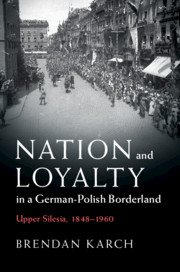Crossref Citations
This Book has been
cited by the following publications. This list is generated based on data provided by Crossref.
Holubec, Stanislav
2020.
New state borders and (dis)loyalties to Czechoslovakia in Subcarpathian Rus, 1919–25.
European Review of History: Revue européenne d'histoire,
Vol. 27,
Issue. 6,
p.
732.
Dabrowski, Patrice M.
2020.
Reinforcing the border, reconfiguring identities: Polish initiatives in the Carpathians in the interwar period.
European Review of History: Revue européenne d'histoire,
Vol. 27,
Issue. 6,
p.
847.
Venken, Machteld
2020.
The dissolution of the Austro-Hungarian Monarchy: border making and its consequences.
European Review of History: Revue européenne d'histoire,
Vol. 27,
Issue. 6,
p.
697.
Polak-Springer, Peter
2020.
Religiosity, Nationalism, and Anti-Jewish Politics in Palestine and Poland: Islamic and Catholic Pilgrimages during the Interwar Era.
Nationalities Papers,
Vol. 48,
Issue. 3,
p.
603.
Osojnik, Janez
and
Maver, Aleš
2021.
Plebiscites in Europe after the First World War.
Studia Historica Slovenica,
Vol. 21 (2021),
Issue. 2,
Gorzelik, Jerzy
2021.
Wiatr z Północy. Dyskursywne konstruowanie Heimat na przykładzie gmachu dawnej Królewskiej Szkoły Rzemiosł Budowlanych w Katowicach i jego wystroju.
Przegląd Kulturoznawczy,
p.
745.
Zielińska, Anna
and
Księżyk, Felicja
2021.
Language shifts in the language biographies of immigrants from Upper Silesia residing in Germany.
Multilingua,
Vol. 40,
Issue. 5,
p.
675.
Sojka, Eugenia
2021.
Cultural Change in East-Central European and Eurasian Spaces.
p.
169.
Woodard, Stefanie M.
2021.
Keeping the “Recovered Territories”: Evolving Administrative Approaches Toward Indigenous Silesians.
Nationalities Papers,
Vol. 49,
Issue. 2,
p.
326.
Bresciani, Marco
2021.
The Battle for Post-Habsburg Trieste/Trst: State Transition, Social Unrest, and Political Radicalism (1918–23).
Austrian History Yearbook,
Vol. 52,
Issue. ,
p.
182.
Gorzelik, Jerzy
2021.
National, Regional, or Just Catholic?—Dilemmas of Church Art in a German–Polish Borderland. Upper Silesia, 1903–1953.
Arts,
Vol. 10,
Issue. 1,
p.
18.
Mor, Maayan
2022.
Government Policies, New Voter Coalitions, and the Emergence of Ethnic Dimension in Party Systems.
World Politics,
Vol. 74,
Issue. 1,
p.
121.
Markowska, Barbara
2022.
Gender and Energy Transition.
p.
153.
Alamdari, Azam
Minoo, Farzaneh Sadat
Assadiasl, Sara
Freidoon, Mahboobeh
Pour-Reza-Gholi, Fatemeh
Soleimanifar, Narjes
Mohebbi, Bahareh
Sadr, Maryam
Lesan Pezeshki, Mahboob
and
Nicknam, Mohammad Hossein
2022.
Expression of Programmed Cell Death 1 and Helios Genes Correlates With rs872071A>G and rs12203592C>T Single-Nucleotide Polymorphisms of InterferonRegulatory Factor 4 in Patients with T-Cell-Mediated Rejection of Renal Allograft.
Experimental and Clinical Transplantation,
Vol. 20,
Issue. 2,
p.
190.
Kozon, Martin J.
2022.
‘Schiebung!’ or sensationalism? The 1. FC Katowice-Wisła Kraków scandal in the Polish Football League’s Inaugural Season (1927).
Soccer & Society,
Vol. 23,
Issue. 8,
p.
949.
Richardson-Little, Ned
and
Stokes, Lauren
2023.
Bordering the GDR: Everyday Transnationalism, Global Entanglements and Regimes of Mobility at the Edges of East Germany.
Central European History,
Vol. 56,
Issue. 2,
p.
159.
Kolář, Ondřej
2023.
Commemorating War in Public Space: The Case of the Ostrava Battlefield.
Historica Olomucensia,
Vol. 64,
Issue. 1,
p.
11.
McLean, Eden K.
2024.
The Un-‘Common Sense’ of National Identity: Luigi Molina, Trentini and the Fascist Italianisation Campaign in Trentino-Alto Adige/Südtirol.
Contemporary European History,
Vol. 33,
Issue. 3,
p.
1094.
Jeličić, Ivan
2024.
Redefining Fiumians: Flag Usage and the Ambiguities of the Nation-Building Process in the Former Habsburg-Hungarian corpus separatum, 1914–1924.
Contemporary European History,
Vol. 33,
Issue. 2,
p.
685.
Kolář, Ondřej
2024.
Sites of Memory in Czechoslovak Silesia 1945–1948.
Journal of Nationalism, Memory & Language Politics,
Vol. 18,
Issue. 1,
p.
1.



